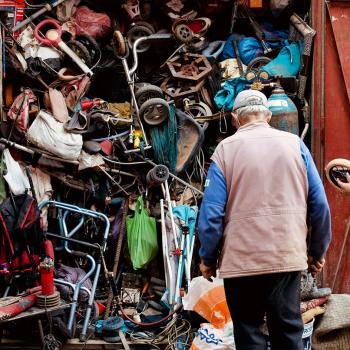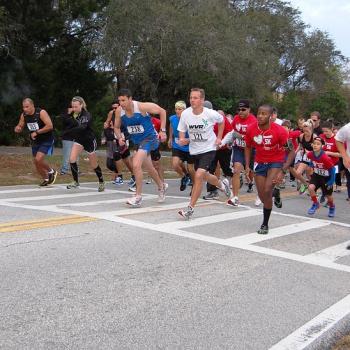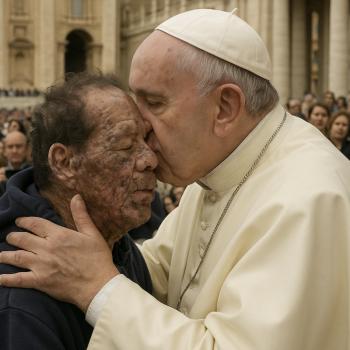The reality, like it or not, is that queer lives have a lot more in them than just coming out, and queer theologies in any and every religion should be prepared to account for this. It is true that Christianity, Judaism, and Islam (and the latter perhaps most of all) have a huge burden in merely allowing for the possibility of coming out theology. Their holy scriptures contain many condemnations of homoeroticism, and these have to be explained away or interpreted in alternative manners in order to grant religious acceptance of people who should, technically, by their gods-given and infallible commandments as enshrined in holy writ, be ejected from the community, if not executed.
Many modern Pagans reading the above, at this point, might feel very good about themselves and their religious communities. Pagan groups, they might reason, are free of moral condemnations of people based on gender identity or sexual orientation. There are no sacred scriptures expressing homophobia that must be marginalized or alternatively interpreted in order to justify the inclusion and acceptance of people with variant sexual orientations or gender identities. In fact, there is a line in the Charge of the Goddess that is held in great esteem and respect by Wiccans and a variety of other modern Pagans that states that "All acts of love and pleasure are my rituals," and does not specify "except gay ones!" Many modern Pagans might reason, therefore, that coming out theology isn't really necessary in our religious frameworks. And, perhaps that is correct.
Unfortunately, my own experience, and that of many other queer people, would suggest otherwise, even with the permissiveness and openness exhibited in a great deal of the modern Pagan religions. Yes, it is true that many (though by no means all) modern Pagan religions are relatively free of overt homophobic statements or doctrines, yet there is often a heterosexist assumption underlying them in terms of cosmology and theology that is by nature exclusive of queer people. As the recent events at PantheaCon have highlighted, queer people who are trans still face exclusion and misunderstanding on a regular basis within various forms of modern Paganism.
When there is queer theology and queer acceptance in modern Pagan religious contexts, and it includes coming out theology, is the latter useful? For many people, it certainly is. Lots of Pagans—queer and otherwise—have noted the experience of feeling a "homecoming" when they at last realize they are Pagan; often when individuals first meet other Pagans, or attend rituals and celebrations for the first time, these feelings of homecoming are further affirmed. Ideally, a coming out experience can be an ecstatic one (even in the literal sense of the term ek stasis, "standing outside oneself"), but it is more of a coming in. It is a full inhabiting of one's own particular identity and a glimpse of one's True Will (perhaps for some people), and thus finding an accepting spiritual group can be this way for both queer and non-queer Pagans. But, again, what about the rest of one's life? There is more to queer life than coming out, just as there is more to everyone's life than finding acceptance amongst a group of people.
Unfortunately, many of the queer-specific pagan groups don't do much in terms of queer theology other than coming out theology. Queer deities (or at least deities who have had some homoeroticism or gender variance in their mythologies) are often identified and then celebrated and worshipped. Encouraging messages from queer ancestors like "Don't be afraid to be yourself" and "Live as fully as you possibly can" are received. Genders and roles in the yearly cycle of festivals are revised, and people dress in drag as they see fit to disturb the status quo of gender presentation. Gender polarity as a relevant model for queer magic is questioned and often discarded. But, what else? Or, is this "enough" for most queer people? And after these matters are addressed, do they simply become much like most other non-queer modern Pagans in terms of their ethics, expectations, and life cycles?
While looking at deities who have had homoerotic or gender-variant episodes in their mythologies is useful and enjoyable, and could be considered "queer theology" (in the sense of looking at the gods and finding or recognizing the queerness that is there), I am not certain that it really goes far enough either. There is, first, the problem of over-identification in terms of divinities. I've heard many people over the years, for example, suggest that there is no reason to pay cultus to Antinous if he is not "just like them" in terms of being gay (in the modern definition of exclusive homoerotic attractions). Yet a huge number of deities have been relevant and important in people's lives who are not "just like them" in any number of ways, including gender, ethnic culture, interests, and any number of other matters. It is strange that so many people think of Antinous as a god exclusively for gay people (and even more for young gay men), when the reality of the Ekklesía Antínoou's membership is that it is mostly people over the age of 35, and has a significant active female population (of all sexual orientations).





